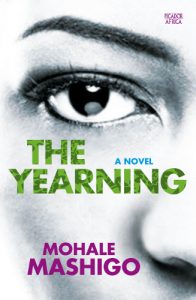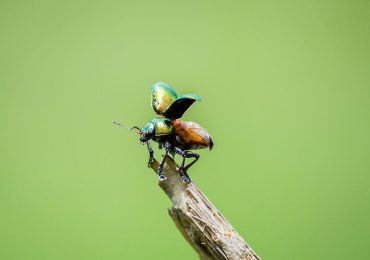As part of our January Conversation Issue, we present new found poetry by The JRB Patron Makhosazana Xaba, a creative effort that creates a dialogue between two literary imaginations.
Xaba found these poems while reading Mohale Mashigo’s The Yearning, as she explains below.
~~~
Yearning
The yearning haunts mother
Hurts the life in me
A part has vanished
I’m faced with possibilities.
The yearning brought us here
In our quiet denial
*
This togetherness
This space exists
for driving out doubts
We climb and descend
drenched in now—complete
with that suitcase.
A melody creeps, pounding, echoing
Something moving at the edge of vision
At the end of an ever-changing place
Moving away; and, crashing together.
*
To necklace
The smell of burning flesh
It’s too late to do anything for the burning man
The burning man is not screaming anymore
The fire is eating away at his throat and his lungs
The Sparks. The Flames.
Notes on the poems, by Makhosazana Xaba
A ‘found poem’, one definition:
A borrowed text, a piece of writing that takes existing text and resets it as a poem. Something that was never intended to be a poem—a newspaper article, a street sign, a letter, a scrap of conversation—is refashioned as a poem through lineation.
—From A Poet’s Glossary by Edward Hirsch
 I found these three poems, ‘Yearning’, ‘This togetherness’ and ‘To necklace’, in The Yearning, Mashigo Mohale’s debut novel, published in 2016 by Picador Africa. In August 2017 the novel won the University of Johannesburg Debut Prize for South African Writing.
I found these three poems, ‘Yearning’, ‘This togetherness’ and ‘To necklace’, in The Yearning, Mashigo Mohale’s debut novel, published in 2016 by Picador Africa. In August 2017 the novel won the University of Johannesburg Debut Prize for South African Writing.
Below I show—instead of explaining—where I found the words. The first number indicates the page on Mashigo’s novel and the second number shows the exact line on the page, whence the words come. This way, anyone interested in examining the original text will be able to find the words with ease.
Although The Yearning was published in 2016, it only reached the number one spot on my ‘December reads’ list on 21 December 2017. As I read The Yearning I was reminded of June Jordan’s often quoted line, ‘we are the ones we have been waiting for’, which ends her poem ‘Poem for South Africa Women’, a response to the watershed women’s march to the Union Buildings on 9 August 1956. These three poems are therefore my version of a writerly embrace of The Yearning, one of the growing numbers of stories we have been waiting for.
Yearning (1.title)
The yearning haunts (1.12) mother (1.12)
Hurts (1.14) the life in me (1.14)
A (1.15) part (1.16) has vanished (1.16)
I’m (1.16) faced with (1.16) possibilities. (1.17)
The yearning (1.17) brought us here
In our quiet denial. (1.18)
- Found in the chapter, ‘The Yearning’, page 5, lines 12–18.
- I found the title of the poem from the title of the opening chapter of the novel without the ‘the’.
- In instances where I found words in the same line but where they were separated by other words—as is the case with the opening line—I demonstrate this by inserting the reference where the separating words appear.
~~~
This togetherness (22.7)
This space (22.9) exists
for (22.10) driving out (22.11) doubts (22.11)
We climb and descend (22.12)
drenched in now (22.13)
complete, with (29.24) that suitcase. (29.25)
A (30.23) melody creeps, (30.24) pounding, echoing (30.25)
Something moving at the edge of (35.25) vision (35.26)
At the end of (52.4) an ever-changing place (52.6)
Moving away and crashing together. (52.13)
- Found in the chapter, ‘Father’, pages 22–52.
- Title found on page 22, line no. 7.
- Exact pages:
22, lines 9–13
29, lines 24 & 25
30, lines 23–25
35, line 26
52, lines 4, 6 and 13.
~~~
To necklace (176.12)
The smell of burning flesh. (176.15)
It’s too late to do (176.17) anything for the burning man (176.18)
The burning man is (176.20) not screaming anymore (176.21)
The fire is eating away at his throat (176.22) and his lungs. (176.23)
The sparks. (176.28) The flames. (176.28)
- Found in the chapter, ‘The Holy Spirit’, page 176, lines 1–28.





